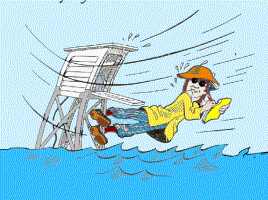The IRG Weather Net held its last daily net for the 2021-2022 season on Friday, May 6. Over the last eight months, observers contributed an estimated 25,000 items of data to help Environment Canada, N.B. River Watch, and other agencies in their forecasting.
An great team of regular observers passed along their morning local weather conditions to net controllers VE9MTB (Rick MacMillan) and VE1CSA (Scott Arnold), and a morning report was sent to the Atlantic Storm Prediction Centre. Often, reports of significant wind, rain or snow are featured in weather reports and newscasts in the Maritimes and Maine media. Data is also used by ECCC by climate researchers and in ground-truthing automated stations.
Now that summer weather is nearing, any severe weather will be handled with activations of the Canadian Weather Amateur Radio Network (CANWARN). These nets could happen at any time of day or night, and the CANWARN net controller will guide you for the specific observations needed - these might be different than the regular weather nets.
When the WX Net returns in the fall, anyone can report measured or observed weather data, you don't need a membership in anything and no special training or equipment is needed. Find out more information about the IRG Weather Net and how to report the weather during the IRG Weather Net at this link.
NEW: IRG Weather Net Tally sheet in PDF format. Use this to record your observations, one page will hold one month of data. Includes instructions.
And for those who need a regular fix of weather information, ECCC produces a monthly summary of weather and climate information, with outlooks for the months ahead. You can find these monthly reports at this new page, in both languages usually available about a week after each end-of-month. https://ve9irg.net/wxsummary

